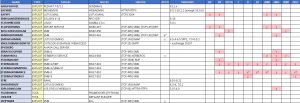Three Things: Oracle’s 299, Flashback, Longreads and 4/20
Day Zero — the day after federal income tax filings were due — came and went, with zero Trump tax returns disclosed to the public. While Trump’s positions on many issues flip-flop and confuse the world, on transparency, ethics, and his tax returns he has been utterly consistent: opaque and unethical.
Fortunately today is 4/20. Do with that what you will. Do you smell brownies?
Speaking of 4/20, did you know that states where marijuana legalization appeared on the 2016 ballot, those initiatives outperformed one or more of the two main presidential candidates? What a candidate or political party might do with that knowledge…anyhow, on with three things.
Unprophetic Oracle
There’s still some fallout after The Shadow Brokers (TSB) release last week of NSA Tailored Access Operations’ (TAO) toolkit. Software vendor Oracle announced a patch for 299 vulnerabilities revealed by the TSB.
Wrap your head around that: 299 fixes.
Bigger than the whopping 276 fixes Oracle issued last summer in one fell swoop.
Now wrap your head around the fact this mega-patch covers a range of corporate enterprise software used for nearly every aspect of business operations, from human resource management to service or manufacturing resource planning.
If the NSA isn’t conducting economic espionage Oracle seems like an odd target to saturate so wide and deeply.
Still haven’t decided what to think of Oracle’s ability to push out this many patches inside a week. Were they tipped off, or were these vulnerabilities so obvious they should have been fixed ages ago? Or maybe this is what happens when a business like Oracle takes its eyes off the ball and focuses on the wrong things like a protracted lawsuit against Google?
Memories, jogged
When I saw this table fragment on Twitter, listing a few exploits revealed by TSB, I had a flashback to the Bush administration.
Gee, I wonder how much of the NSA TAO-Equation Group toolkit could explain the White House’s missing emails post-Plame outing?
Longreads: Economics, Liberalism, Google’s first moonshot
These are worth your time yet this week or weekend.
The Liberal Order Is Rigged by Jeff D. Colgan and Robert O. Keohane in Foreign Affairs (registration required) — An examination of liberalism’s failure and how the failure led to anti-democratic populism. In my opinion, this assessment is good but simplistic; the knee-jerk reaction many will have to the word ‘liberalism’ alone indicates there is far more at work than liberalism failing to deliver on its merits. It’s still worth a read; we must begin to pick out and save the liberal from neoliberal if we are to save democracy. Must say I’m surprised at Foreign Affairs’ steady shift away from rigid conservatism as well as neoliberalism.
The moral burden on economists — Darryl Hamilton’s 2017 presidential address to the National Economic Association warns against treating economics as a morally neutral ‘science’. How much of the failure of liberalism is really due to immoral/non-neutral application of economics?
Torching the Modern-Day Library of Alexandria by James Somers for The Atlantic — This tagline is quite the hook: “Somewhere at Google there is a database containing 25 million books and nobody is allowed to read them.” Heartbreaking to think there hasn’t been a middle ground to free these books to the public. In my opinion, Google is out the money on the scanning process. What would happen if they spun off this effort as a nonprofit digital Library of Alexandria? Could the funds from books approaching out-of-copyright date pay for the upkeep and digitization of new works?
Chaffetz out?
I don’t even know what to think of the rumors that Rep. Jason Chaffetz may leave Congress before his term ends December 2017. Some speculate his role in cutting funding directly related to security for diplomats plays a role; others speculate the decision is based on a more personal driver. I hope he can live with what he’s done and what he may yet choose to do. I’d hate to have to explain myself to my kids if I’d made some of his decisions to date.
There’s your three things and a lagniappe. À bientôt!





Oracle patching faster than Adobe?
Whod a thunk it?
Isn’t retro-cover grand?
I read the Library article and it is definitely a good read. Some tough choices there. The one comment struck me: The Harvard person said basically that yeah, the books will be chap now, but who’s to say that pricing won’t progress as the pricing for academic journals has progressed, to the point wher they are basically unaffordable. Now, perhaps that would never happen with a 100 year old book, but who’s to say that someone wouldn’t really want it and decide “Yes, I’ll pay $12.99 instead of $2.99.” And there are lots of other sound arguments about how this is the wrong vehicle to make the books accessible. Too bad. In my humble opinion, the length of copyright is the real culprit here, but to get Congress to shorten it is impossible. Ah well, some problems you just can’t solve. Thanks for the tip.
Agreed, it’s a good read. Amazing that all those people/entities could work so long AND come to an agreement, and yet…long labor for a still birth.
I wonder what percentage of the books written since Gutenburg invented his press is worth saving. Would it be helpful to future generations to be able to google up ancient verbal pot-shards from our time and try to piece together a vision of our life, now?
Also, do universities, etc. scan the books in their collections?
The best thing about the “rigged” article is Rayne’s comment:
I could only get half way through the one about economists…
WRT: Chaffetz… I guess he feels his work in Congress is done. Any word on how his constituents are taking the news?
Thanks for the reading suggestions, Rayne.
If you have time, you may be interested in this:
“Build a Better Monster: Morality, Machine Learning, and Mass Surveillance”, a talk [Maciej Ceglowski] gave on April 18, 2017, at the Emerging Technologies for the Enterprise conference in Philadelphia.
In that talk, he refers to Zeynep Tufekci’s June 2016 Tedtalk:
Machine intelligence makes human morals more important
Economics is fundamentally political, as political as it is quantitative or descriptive. It is about human choices regarding the use of limited resources, about who pays a cost and who obtains a benefit. It aims to provide a rationale for such choices, and often a cover for the agency involved in making them. Economics is not a neutral arbiter. Its use inescapably involves moral choice, agency and intent.
The important point is that Oracle only patched these 299 bugs because someone ratted them out. The second point is that the patch could come quickly because the bugs were easy to fix, which is to say that they should have been easy to find and therefore fixed long ago, and further that they reflect an extreme carelessness about the development process in the first place. It is only necessary to spend a few seconds reading about Larry Ellison to deduce that any software that he oversaw must be very sloppily written.